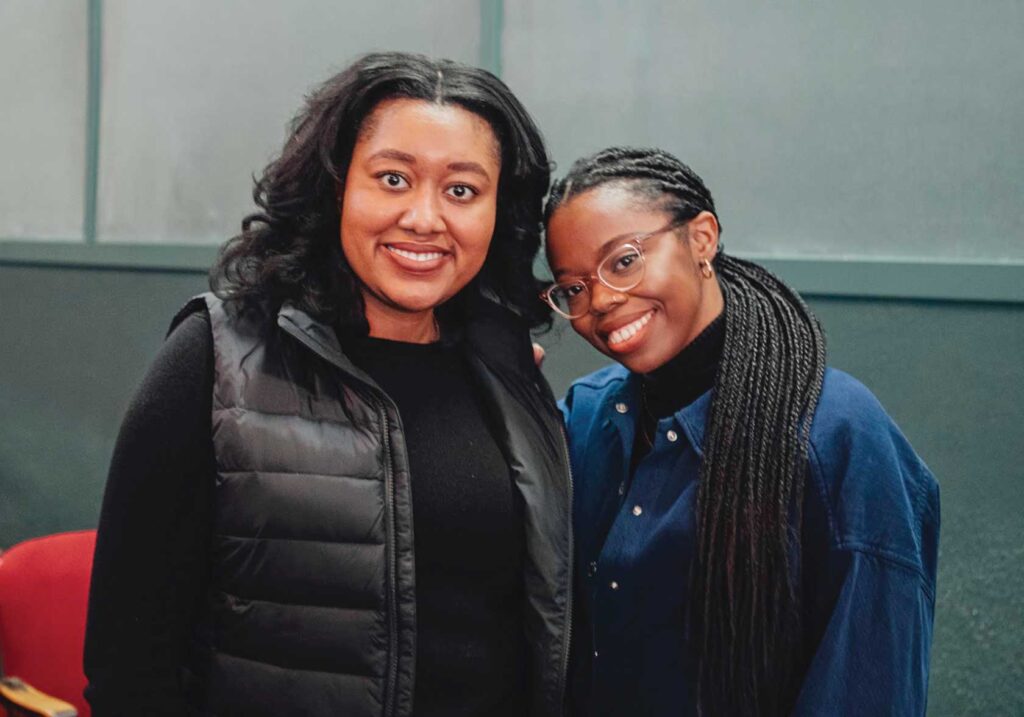These scientists are helping Bostonians prepare for the forthcoming total solar eclipse

In less than a month, the moon will pass between the Earth and the sun, placing itself in just the right position to block the sun’s rays. The result will be a rare astronomical sighting: a total solar eclipse. On April 8, people in parts of the United States, Canada and Mexico will be treated to this spectacular experience, the first one in the region since 2017 and the last one until 2044.
“There’s nothing else like it,” said Titi Shodiya, a materials scientist and engineer. “It’s a global experience where at different times in history, cultures have experienced solar eclipses, and you have to wait a long time for the next one to come…. For some folks, it’s a once in a lifetime experience.”
Shodiya is one half of Dope Labs, a science and pop culture podcast that she hosts and executive produces alongside friend and molecular biologist Zakiya Whatley. Together the charismatic duo talks listeners through topics ranging from the science fictional natural element “vibranium” to the ins and outs of organ transplants.
The pair met in grad school, where they bonded over their scientific interests, but each of their introductions to the field was different. While Shodiya’s parents encouraged her long-standing curiosity about mathematics and science, igniting her passion for engineering, Whatley’s journey to science was less linear.
As a young girl, Whatley was a generalist — interested in trumpet, dance, nursing. It wasn’t until she enrolled in a program through Brown University that she discovered her enthusiasm for biology.
Shodiya and Whatley aren’t the typical faces of science. Women have made notable advances in STEM fields in recent years, making up about half of STEM workers, but they remain underrepresented in subdivisions such as physical sciences, computing and engineering, according to 2019 data from the Pew Research Center.
The same report found that Black and Hispanic people accounted for just 9% and 8% of all STEM workers, compared to white people, who accounted for 67%. For Black women, like Shodiya and Whatley, representation is even more meager.
The “Dope Labs” cohosts said they relied on community-building to shape and sustain them during their embryonic days, leading them to where they are now — hosting a notable podcast, taking on public speaking gigs and, now, partnering with the Museum of Science to educate people on the upcoming eclipse while their podcast is on hiatus.
The 2017 total solar eclipse was the first one in almost a century. This year’s eclipse is special for a different reason. Seven years ago, the eclipse’s path stretched from the northwest to the south of the United States, according to a map from NASA. This time, the path is in the opposite direction, from the northeast to the south, putting it the way of a greater number of people. This means at least a partial eclipse will be visible in all the 48 contiguous states in the U.S.
Massachusetts isn’t directly in the path of totality, the view of the moon as it blocks the sun’s visible surface entirely, but people in the western parts of the state will be close. Shodiya and Whatley encouraged those who are willing and able to make the trek to locations along the path of totality, like upstate New York, to do so. There, spectators will be able to view the sun’s outer ring, the corona, during four minutes of totality, which typically isn’t visible to the human eye. The partial eclipse is expected to last between 70-80 minutes. No matter where and how you choose to view the event, preparation is key.
“I think this is really exciting [but] this is not the event for procrastinators,” said Whatley. She emphasized the importance of acquiring certified protective eyewear — not regular sunglasses — from a reputable site, such as the Museum of Science.
Alternatively, the scientists said viewers can improvise with DIY solutions by, for example, poking a hole in a piece of paper, facing away from the sun and holding the paper up to view the moon’s movement via the shadow projected through the pinhole. The same can be done using a colander. While spectators won’t be able to watch the eclipse directly using these methods, they are a safe way to participate without the recommended eyewear.
The eclipse can also serve as a teaching moment, Shodiya said. It’s an “opportunity to explain how these things work if you have small kids or younger people [for whom] this is their first experience of a solar eclipse.” It offers a chance to ask and answer questions like: Where’s the sun? Where’s the moon? How does this work? Why does this work?
And while the eclipse is a highly visual event, the auditory experience is often overlooked. Whatley recommended that spectators keep their ears peeled during the eclipse and notice the surrounding sounds — the chirping of birds, the barking of dogs — or lack thereof. The momentary darkness may have an unusual effect on nature, including confusing some animals by disrupting their daily habits, TIME magazine reported in 2017.
Whatley said she missed the last eclipse because “I just didn’t feel like what was happening in space belonged to me before.” But the recent proliferation of commercial space travel and her growing appreciation for the interconnectedness of life pushed her to take a real interest in the awe-inspiring event.
“For some reason, this eclipse feels like it’s really mine, and nothing’s really changed, but me,” she said. “So I would encourage other people to embrace this eclipse as their own too, even if it feels like it’s not a thing they traditionally participated in.”






